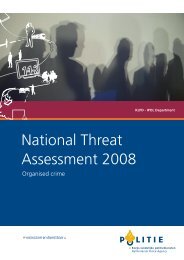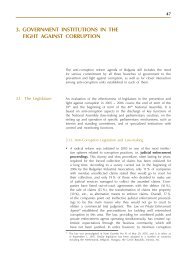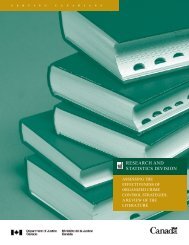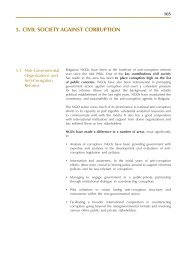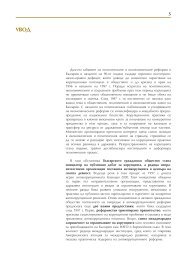6. Conclusion (PDF, 69 kb) - Center for the Study of Democracy
6. Conclusion (PDF, 69 kb) - Center for the Study of Democracy
6. Conclusion (PDF, 69 kb) - Center for the Study of Democracy
Create successful ePaper yourself
Turn your PDF publications into a flip-book with our unique Google optimized e-Paper software.
115<br />
CONCLUSION<br />
There are several factors that determine Bulgaria’s entry into <strong>the</strong> crucial<br />
phase <strong>of</strong> its anti-corruption re<strong>for</strong>ms. First, <strong>the</strong>re is a positive trend,<br />
captured both by Coalition 2000’s Corruption Monitoring System and<br />
by international surveys after 1997, <strong>of</strong> a decrease <strong>of</strong> administrative<br />
corruption that should be developed fur<strong>the</strong>r. There were some<br />
indications in late 2004 <strong>of</strong> a marginal increase in corruption prevalence<br />
compared to earlier that year. This implies that anti-corruption policies<br />
may be exhausting <strong>the</strong>ir effect and need to be consolidated and<br />
expanded. Second, political and large-scale corruption, which has<br />
been only slightly affected by re<strong>for</strong>ms so far, impacts negatively on<br />
competitiveness and economic growth. This may lead to a vicious<br />
circle in which low economic efficiency bolsters corruption and vice<br />
versa. Third, <strong>the</strong> success <strong>of</strong> Bulgaria’s integration into <strong>the</strong> European<br />
Union depends on how it confronts corruption. Corruption hampers <strong>the</strong><br />
country’s accession process in several ways: it weakens its institutions<br />
and impedes <strong>the</strong> implementation <strong>of</strong> common EU rules and policies;<br />
it heightens <strong>the</strong> risk <strong>of</strong> embezzlement and poor management <strong>of</strong> <strong>the</strong><br />
EU pre-accession and structural funds; and it facilitates <strong>the</strong> “export” <strong>of</strong><br />
crime to <strong>the</strong> Union.<br />
The challenges and opportunities <strong>of</strong> EU membership require that anticorruption<br />
re<strong>for</strong>ms be an integral part <strong>of</strong> Bulgaria’s overall modernization<br />
strategy. In this context, <strong>the</strong> priority areas <strong>of</strong> anti-corruption policy in<br />
<strong>the</strong> next few years should be a fundamental re<strong>for</strong>m <strong>of</strong> <strong>the</strong> judiciary<br />
and law-en<strong>for</strong>cement and <strong>the</strong> curbing <strong>of</strong> organized crime and <strong>the</strong><br />
hidden economy. Anti-corruption policies should be more tailored<br />
to specific areas as well as targeted at <strong>the</strong> broader root causes <strong>of</strong><br />
corruption:<br />
• Continuing <strong>the</strong> development <strong>of</strong> democratic institutions. Constitutional<br />
changes should introduce improved checks and balances <strong>of</strong> <strong>the</strong><br />
branches <strong>of</strong> government thus enhancing <strong>the</strong>ir anti-corruption potential.<br />
In order to meet <strong>the</strong> - as <strong>the</strong> USAID Anticorruption Strategy puts<br />
it - “dual challenges <strong>of</strong> grand and administrative corruption” 10<br />
mechanisms <strong>of</strong> democratic control should be rein<strong>for</strong>ced. Specialized<br />
anti-corruption units should receive more authority and higher pr<strong>of</strong>ile.<br />
Legal provisions on political party financing, lobbying, campaigning<br />
and <strong>the</strong> restriction <strong>of</strong> political intervention in <strong>the</strong> judiciary, economy<br />
and media should be considered with priority.<br />
10<br />
USAID Anticorruption Strategy, January 2005, p.2
116 ANTI-CORRUPTION REFORMS IN BULGARIA<br />
• An effective and stable judiciary that is free from corruption is<br />
<strong>the</strong> most powerful agent <strong>of</strong> <strong>the</strong> rule <strong>of</strong> law and anti-corruption.<br />
Thus, anti-corruption re<strong>for</strong>ms in <strong>the</strong> judiciary and law-en<strong>for</strong>cement<br />
should remain a priority area in Bulgaria’s progress towards EU<br />
accession. Several key challenges must be met: completing <strong>the</strong><br />
re<strong>for</strong>m in <strong>the</strong> pre-trial phase <strong>of</strong> <strong>the</strong> criminal process; trans<strong>for</strong>ming<br />
<strong>the</strong> role and functions <strong>of</strong> <strong>the</strong> investigation and prosecution bodies 11 ,<br />
making judicial bodies and law en<strong>for</strong>cement improve <strong>the</strong>ir in<strong>for</strong>mation<br />
exchange and cooperation.<br />
• Market economy institutions should be streng<strong>the</strong>ned to encourage<br />
legitimate business. Economic freedom and competition need to<br />
be bolstered, business should be burdened less by bureaucracy, and<br />
business ethics should be promoted. Bulgaria’s economic growth is<br />
held back by a lack <strong>of</strong> consistent policy to promote competition,<br />
as well as by monopolies established through political corruption.<br />
Bulgarian business is still debilitated by a heavily bureaucratized<br />
administrative control system which leads to excessive costs and<br />
corruption. Corruption schemes allowing a particular bidder to win<br />
in public tenders and concessions still exist. It is also important to<br />
set clear and transparent provisions on <strong>the</strong> use <strong>of</strong> EU pre-accession<br />
funds and to build a reliable system <strong>for</strong> internal and independent<br />
oversight <strong>of</strong> <strong>the</strong>ir programming and management.<br />
• Reducing <strong>the</strong> influence <strong>of</strong> organized crime in government and <strong>the</strong><br />
economy. Suppressing <strong>the</strong> economy <strong>of</strong> crime would be an important<br />
step towards reducing corruption practices which sustain it in <strong>the</strong><br />
first place. The customs administration is still implicated in significant<br />
corruption and customs fraud in export/import deals and smuggling<br />
operations. Business and its associations are crucial stakeholders in<br />
ridding <strong>the</strong> economy <strong>of</strong> its gray sector and corruption and should<br />
be thus involved in anti-corruption policies. Bringing <strong>the</strong> hidden<br />
economy below 20% <strong>of</strong> GPD be<strong>for</strong>e <strong>the</strong> time <strong>of</strong> Bulgaria’s accession<br />
to <strong>the</strong> EU is a bold but realistic target.<br />
• Civil society should maintain its active role in anti-corruption<br />
initiatives. NGO ef<strong>for</strong>ts should venture into areas where re<strong>for</strong>m is<br />
underdeveloped or is yet to be launched, such as health care re<strong>for</strong>m,<br />
education, and social security. Reducing corruption in <strong>the</strong>se public<br />
services would indicate that <strong>the</strong> country is irreversibly on <strong>the</strong> road <strong>of</strong><br />
successful and sustainable re<strong>for</strong>ms.<br />
A strategy <strong>of</strong> social modernization has to rely on an effective anticorruption<br />
policy. Even a well-designed anti-corruption program would<br />
fail to bring about lasting impact if implemented outside <strong>the</strong> overall<br />
philosophy <strong>of</strong> legal, institutional, social and economic re<strong>for</strong>ms. Anticorruption<br />
re<strong>for</strong>ms should follow a holistic approach and when properly<br />
coordinated should manage to increase <strong>the</strong> risk, cost and insecurity <strong>for</strong><br />
11<br />
The case <strong>for</strong> <strong>the</strong>se re<strong>for</strong>ms has been extensively argued by Coalition 2000 and <strong>the</strong> <strong>Center</strong><br />
<strong>for</strong> <strong>the</strong> <strong>Study</strong> <strong>of</strong> <strong>Democracy</strong> in <strong>the</strong> period 2002-2004. See Judicial Anti-Corruption Program,<br />
S<strong>of</strong>ia, 2003 and Corruption Assessment Report 2003.
CONCLUSION 117<br />
both parties to a corruption deal. As long as corruption is perceived as a<br />
low-risk, low-cost, high-pr<strong>of</strong>it endeavor, <strong>the</strong> ef<strong>for</strong>ts towards its reduction<br />
will be <strong>of</strong> small consequence.<br />
Effective coordination between all stakeholders - <strong>the</strong> legislature, <strong>the</strong><br />
executive, and <strong>the</strong> judiciary with all <strong>the</strong>ir separate agencies; <strong>the</strong> central<br />
and local governments and institutions; NGOs and <strong>the</strong> media - is a<br />
must <strong>of</strong> <strong>the</strong> anti-corruption process. Civil society should keep <strong>the</strong><br />
momentum <strong>of</strong> its anti-corruption initiatives and maintain its crucial<br />
watchdog function. The latter, toge<strong>the</strong>r with <strong>the</strong> partnership <strong>of</strong> public<br />
and private institutions are <strong>the</strong> key factors <strong>for</strong> <strong>the</strong> success <strong>of</strong> anticorruption<br />
re<strong>for</strong>ms.



